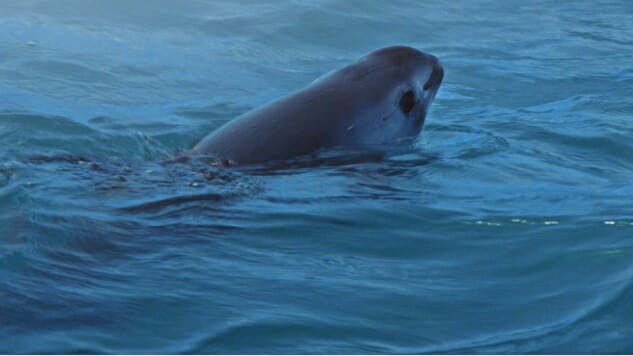In San Felipe, Mexico, there are fishermen who think people are making up an imaginary endangered animal to screw with their livelihood. It’s not a completely unreasonable extrapolation given there are fewer than thirty vaquitas left in the world-even if you make your living on the sea you’ve got long odds of ever seeing the world’s smallest porpoise. But Sea of Shadows, executive produced by Leonardo DiCaprio and directed by Richard Ladkani (The Ivory Game), gets a few glimpses of them. (They are, by the way, unbearably cute.)
The vaquita are being driven to extinction by vast amounts of gill-netting placed by traffickers who are stripping the Sea of Cortez of its population of totoaba, a massive drum fish whose swim bladder has the dubious distinction of being on the list of animal parts believed in China to have fertility-boosting mojo. A single swim bladder can fetch upward of $10,000 on the black market. The mass slaughter of vaquitas isn’t even deliberate: They’re bycatch. This unfortunate confluence of circumstances makes Sea of Shadows a grim and rather strange film, part fast-paced eco-thriller and part true crime program. (If you’re expecting a Blue Planet-esque genteel hand-wringing over dazzling underwater shots of exuberantly rich and diverse life, you will not be getting that here.) It follows a Sea Shepherd crew, a Mexican news anchor, a cartel boss and a conservationist. Ladkani’s camerawork is agile and sleek, and the editing is super-sound, so even with a complicated web of crime, corruption, socioeconomic tension, multiple languages, blurred-out faces and folks who operate in the dark, it’s easy to follow. The film leans toward a gritty, stripped-down esthetic that lets you know you’re in the call-to-action band of the documentary spectrum: This is an ecological emergency. Poachers in thrall to a piscine Pablo Escobar and greedy apothecary-traffickers on the other side of the world are exterminating vast amounts of marine life in the Sea of Cortez, and the balance of an entire ecosystem (and a really important fishery) hang in the balance. The Sea Shepherd crew cruises around ridding the water of these nets, but they’re innumerable, asphyxiating animals of all kinds. They capture a vaquita in an attempt to begin a human-care situation for the vanishing cetaceans; the result is heartbreaking. The sense of a ticking clock and a veritable gill-net of bullshit and corruption and danger is intense and vivid. And for those of us who have a hard time grasping the concept of people threatening and killing each other over a fish organ, there’s some rather amazing action both on land and on the water that proves people are not wrong to be scared for their lives that the totoaba cartel will come for them if they don’t play along. The whole thing’s a brisk, keen-sighted and comprehensive look at what happens at the confluence of greed, short-sightedness and desperation.
Impassioned, educated, clear-eyed people are doing as much damage control as they can-not just the people on the Sea Shepherd vessel but news journalist Carlos Loret de Mora and plenty of reasonable, balance-minded fishermen in the gulf, for example-but the message is clear that it isn’t enough. If the market for totoaba bladders doesn’t disappear, the porpoises will, and we will have knowingly, wantonly driven a whale to extinction.
Directors: Richard Ladkani, Sean Bogle (co-director), Matthew Podolsky (co-director)
Starring: Romel Eduardo Ledezma Abaroa, Rafael Pacchiano Alamán, Hector Capetillo, Andrea Crosta, Marc Davis, Carlos Loret de Mola, Jack Hutton, Jacqueline Le Duc
Release Date: July 12, 2019
